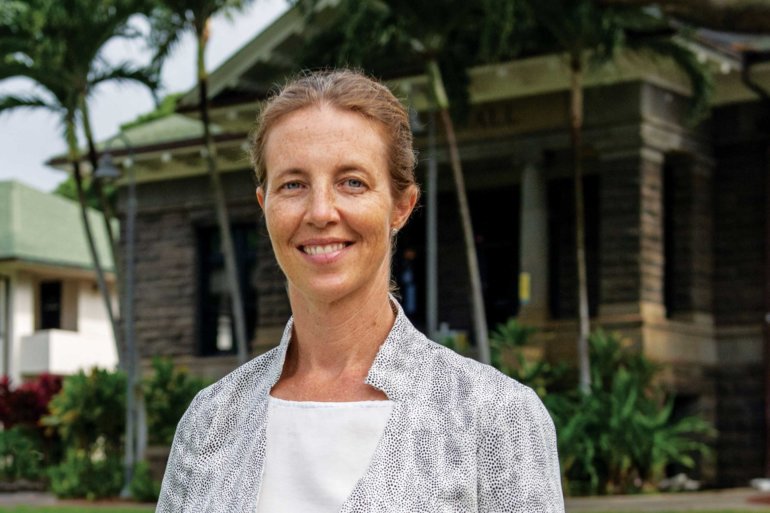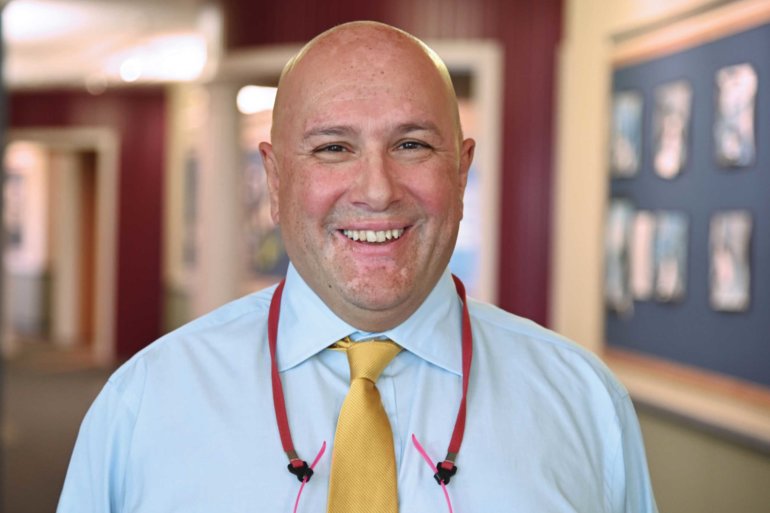Small World, Big Dreams
Q&A: Emily McCarren
During her distinguished 16-year tenure at Punahou, Emily McCarren has taught all levels of Spanish, traveled the world as head of Wo International Center and championed the aspirations of nearly 2,000 students, faculty and staff as Academy principal. She has helped the School launch consequential initiatives and make strategic shifts during the pandemic.
In her next role, McCarren will be head of Keystone Academy, an international school in Beijing. She will undoubtedly continue to draw from her creativity and passion to forge meaningful educational experiences — aimed at helping students reach new heights.
You started your career at Punahou as a Spanish teacher in 2006. How did that experience influence your role as principal?
It is the foundation. As a teacher, your job is to ensure that kids have everything they need to succeed and learn. And as principal, my job is to make sure that teachers have everything they need to succeed and learn and grow in servicing our kids. So it’s really the same job, just from a different point of view. I love both of those jobs.
What are some impactful initiatives that rolled out during your tenure?
I’m really proud of the foundation and the evolution of the Support and Wellness department. I am proud of how we care for our kids – both the kids who may be in a crisis and also the students who learn about the care and the systems that are available to assist them. There’s still a lot of really exciting work to do in that space, but I’m really proud of where we are today.
And I’m proud of the fact that the Academy curriculum continues to evolve and respond to the changing world. A good school has a great traditional academic catalog. And an amazing school, such as Punahou, is constantly expanding the definition of that. So I’m really proud of how the faculty at Punahou have the agency to dream big and create experiences for kids that might not be possible at other places. Our teachers are not limited by constraints and boundaries of what’s possible.
The pandemic has profoundly altered the way in which schools operate. What opportunities have emerged from that pivot?
There are so many vibrant opportunities that have come about, but the notion that relationships matter in learning became even clearer. When you are forced to pare down, you always have to focus on making sure that you’re establishing strong connections between people, regardless of whether you’re in person or online.
One exciting opportunity is how easy it has become to have guest speakers from other parts of the world. We’ve always done that at Punahou, but now every single teacher on campus knows how accessible the world is to them at any minute through Zoom or Webex.
And then there are the questions about what parts of the Punahou experience are scalable and replicable to broader communities. I think that’s a question that the School will keep exploring, which is really exciting.
Prior to becoming principal, you were the director of Wo International Center. What role does global education play in preparing students for a rapidly changing world?
It is central. Global competencies are a series of skills that enable people to work and thrive in diverse communities. It’s not just about international education. It’s about how we work across differences and negotiate meaning and execute visions and goals.
One of the amazing things that our courses do is that they ask kids: How do you make things better? How do you tackle something at scale? How do we replicate solutions in different spaces? Those global competencies are critical for everybody.
Your next chapter is to be the head of Keystone Academy in Beijing. How will your time at Punahou help in that important next step?
Punahou has helped in so many ways. It has given me a strong foundation. When I was becoming head of Wo Center, I was fortunate enough to overlap with the great Hope Staab, who was my predecessor. Part of my orientation was traveling with her around Asia as she introduced me to Punahou partner schools. She was a trailblazer and her mentorship has been crucial in my overall development.
What advice do you have for your successor, Gustavo Carrera, who will assume the role of Academy Principal in July?
Gustavo is taking on the coolest job in America. He will have the extraordinary opportunity to work with some of the greatest humans on the planet and the coolest student body. It is a place of limitless potential. So my advice is to listen to colleagues. There’s so much brilliance and care for kids that you just have to keep your ears open for people’s amazing ideas and then figure out how it all fits together.
What will you miss most about Punahou?
I’m going to miss the people. I’m going to miss the campus. I’m going to miss our students. Punahou’s optimism and hopefulness about the future of education is remarkable. I will carry that wherever I go.
– By Gina Gelber
Elevating Voices
Q&A: Gustavo Carrera
Gustavo Carrera is passionate about equity. He has seen its power — and urgency — through the lens of a child growing up under a military dictatorship and later in life as an immigrant and father of two daughters. “We can only have meaningful breakthroughs when everyone has been heard,” says the award-winning educator who will assume the role of Punahou Academy Principal in July. “One of my central responsibilities as an educational leader is to facilitate conversation and ensure that diverse viewpoints are being represented.”
In his first interview with the Punahou Bulletin, Carrera discusses his passion for history and how it has propelled him to raise consciousness about pressing global affairs. He also shares how he plans to forge deep ties within the Punahou community and how he will balance tradition and innovation in the Academy.
You were born in Buenos Aires. What was your childhood like?
I am a child of the seventies who grew up during a military dictatorship. As a kid, I wasn’t fully aware of what this meant, but once I got to college and started exploring that moment in time, it became clear that my role in the world was to understand why injustice occurs. That’s why I got into history.
You graduated from Columbia University with a bachelor’s degree in history and hold a master of arts in teaching American history and government from Ashland University. How has this background in history influenced your educational philosophy?
It has had a deep impact in my role as teacher and administrator. I have a deep commitment to an equitable education and to the promotion of justice. Raising other people’s consciousness to the challenges that we face in the world is incredibly important for me. The concepts of moral, social and personal responsibility should be central in everything we do inside – and outside – of school.
Most recently you were the Head of Upper School at Shore Country Day School in Beverly, Massachusetts. What are some of the opportunities and challenges you see in transitioning to one of the largest private schools in the nation?
I have loved working for Shore. It’s a great school, and we pride ourselves on knowing each student very well, and that allows us to build the competencies within each student to become a lifelong learner.
That said, I would say that one of the things that I’m looking forward to is Punahou’s scale, because it can provide the opportunity for every student to explore their own interests within the context of the school itself. Oftentimes, at smaller schools, students needs to go outside of the school community to pursue their passions. While I’m still learning about Punahou, it strikes me that the size of the school creates a culture where each student is celebrated and can pursue their own passions.
I’m also excited about some of the initiatives that are already in development at Punahou. I’m very excited about the emergence of the new Academy Learning Commons. I think it will be a transformative space where students are going to be able to extend their collaboration. Students learn in places that promote thinking and make thinking visible – the Learning Commons will be a place where students can do those things and connect with each other.
How will you strike a balance between tradition and innovation at Punahou?
Innovation happens in stages, and should be the product of a deeply collaborative process that cannot be anyone’s singular vision. When you have a singular vision dominating, change is not lasting – and it’s not lasting because it doesn’t permeate the culture. I think it’s important to bring all the voices to the table so that we can celebrate what we do well and explore our growth edges.
You are known for being highly engaged with your students. How will you continue that practice at Punahou?
I hope to continue advising and teaching. I love having advisees and am looking forward to this at Punahou. I am also really looking forward to teaching again, especially history. I also think that developing meaningful relationships with students keeps me grounded with the everyday experiences of a school.
Punahou families are deeply involved in their children’s education. How do you plan to create strong relationships with them?
The partnership between a school and its families is fundamental in helping students to develop and grow. It always needs to be a relationship of mutual support. I get along very well with parents because we have the same common purpose, which is the growth of each child. It’s very easy to have empathy for parents because they are trying to ensure that their child gets the best possible education. I look forward to establishing meaningful connections with the community.
What do you and your family like to do for fun?
Growing up, my dad had a job that brought us to Patagonia and to Cordoba, which is at the footsteps of the Andes, for big chunks of time. Those experiences gave me a true love and respect for our environment and the outdoors. My wife, daughters, and I love to go hiking and walking, particularly when those hikes take us to beautiful views and interesting landscapes.
We also love cooking, swimming, and spending time with friends and family. Puzzles and building LEGO are popular at my house right now. We also enjoy going to museums.
– By Gina Gelber



